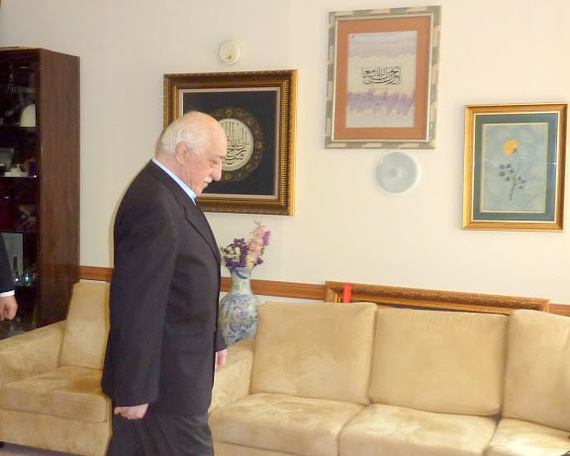 |
| Turkish Islamic scholar Fethullah Gülen. (Photo: Today's Zaman) |
Turkish Islamic scholar Fethullah Gülen has warned against adventurism as well as using force to respond to demonstrations that have turned violent since reports that the terrorist Islamic State in Iraq and the Levant (ISIL) has captured the strategic city of Kobani (or Ayn-al Arab) over the weekend.
The problems should be addressed without spilling blood or sparking hate, Gülen urged, warning against the use of force.
“The guns we often resort to in today's world perpetuate hate, strengthen and churn up vengeful feelings and animosity and inflame the fire further,” he said, recalling that the Kurdish problem has been exacerbated in the last 40 years because of the application of force to find a solution to the problem.
Interior Minister Efkan Ala used threatening language towards protesters in a statement to reporters late on Tuesday. Calling on all protesters to go home, Ala said: “The violence will be returned in double. [...] Otherwise, results that cannot be predicted might occur.”
Ala's threat of violence against demonstrators has been criticized on the grounds that the state can only use force when necessary and justified, and only in a measured response.
Islamic scholar Gülen said the Turkish government could have approached the matter from a different perspective by using education and the economic and social policies that the people in the region have been waiting for.
“Why have you not tried to win their hearts?” he asked, lamenting the lack of rights given to Kurds by the state.
Gülen also noted that the Quran's principles dictate that Muslims approach their problems with a peace-oriented attitude and soft-spoken language rather than through harsh words.
“If the resolution of a problem is possible with a peace, then you should not be adopting harsh behavior,” he said.
Gülen has been known for his advocacy of expansive Kurdish rights, including education in their mother tongue, and has criticized successive governments for using a heavy-handed approach, including military force, when suppressing Kurdish demands.
He has urged his followers to establish modern schools in Turkey's predominantly Kurdish regions in the southeast, despite the threat of the terrorist Kurdistan Workers' Party (PKK).
Gülen also repeated his earlier warning about the dire consequences that may result from Turkey's unilateral involvement in a mission in Syria or Iraq that goes against the mission of the international community.
The Turkish authorities should avoid any action that might cause the Turkish people to experience sorrows similar to those of World War I, he had earlier said.
Gülen emphasized that all of the Islamic Prophet's wars were defensive in nature, saying that Muslims cannot wage war unless they have been attacked directly or if there is a real possibility of imminent attack.
He reiterated that the Turkish government should not engage in adventurism that might lead to unknown conclusions.
In a speech published on Oct. 4 on herkul.org, a website that publishes his speeches, Gülen said those who are working to turn Turkey into an intelligence state -- in a clear reference to the government of the Justice and Development Party (AK Party) -- should not be overcome by aspirations to make Turkey enter a war “here and there.”
Mr. Gulen was referring to President Recep Tayyip Erdoğan's insistence that the mission include the toppling of the Bashar al-Assad regime.
“My wish from God is that they [government officials] do not enter a war here and there and make the people [of Turkey] experience a new World War I, as the Committee of Union and Progress [(CUP), which has been accused of dragging the Ottoman Empire into World War I] after they [the committee] were overcome by their aspirations and made the Devlet-i Aliye [the Ottoman Empire] the victim of an adventure,” Gülen said.
Gülen's speech came at a time when Parliament had voted to grant the government unlimited powers to send troops abroad for one year and to allow foreign forces to use Turkish territory for possible military operations against ISIL. The motion led to serious concerns that Turkey may become involved in the military campaign against ISIL in Syria and Iraq.
Gülen has clearly supported international actions against ISIL, which is also known as ISIS. In his recent message published in US newspapers, he said, “ISIS actions represent those of a terrorist group and they should be brought to justice and compelled to answer for their horrific crimes.” He also said that it is incumbent upon all of us to join hands to counter and defeat, through legitimate means, any extreme ideology or violent radicalism.
Based on his message from yesterday, while he still very much supports international and Turkish action against the ISIL threat, he is against the idea of the Turkish government unilaterally focusing on toppling the Assad regime, as that would be against the international community's core mission and will put Turkish people in harm's way.

![[Part 1] Islamic scholar Gülen calls conditions in Turkey worse than military coup](http://cdncms.todayszaman.com/todayszaman/2014/03/16/hizmet-movement.jpg)







